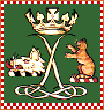Scottish History
The history of the Argyll and Sutherland Highlanders
The Regimental Museum in Stirling Castle
India, 1857 - 1870
In 1855 the S.S. Mauritius, carrying 1,070 of the 93rd, berthed at Calcutta. The new Commander-in-Chief in India, Sir Colin Campbell, came on board to be greeted with rapturous cheers.

Pipes played at the Relief of Lucknow. During this action Pipe Major John McLeod with 7 pipers struck up the "Haughs of Cromdell" also known as "On wi' the Tartan". When complimented on their piping by Sir Colin Campbell, McLeod replied "I thought the boys would fight better with the national music to cheer them..."
Though a Black Watch man, Sir Colin seems always to have had a particular affection for the Sutherland Highlanders. When he set off on his desperate venture to relieve Lucknow with only 4,000 men to meet four times that number of well-trained and desperate mutineers who had no choice but to win or die, the Governor-General Lord Canning wrote to cheer him on his way. "You have your beloved 93rd."
The campaign reached its crisis on 11 November 1857, when the army faced the two great fortresses of the Sikanderbargh Gate and, behind it, the Shah Najaf, both solidly built, strongly manned, and heavily gunned. When his own gunners had knocked a hole no more than three feet square in the Sikanderbargh wall, Sir Colin ordered a drummer of the 93rd to sound the advance, and the regiment swept forward to the tune of The Haughs of Cromdell. Nine officers and men got through the hole, including Colonel Ewart in command and the 14 year-old drummer boy, who was killed.

Fighting fiercely hand-to-hand and helped by some of the loyal 4th Punjabis, they got the gate open.
There remained the still more formidable Shah Najaf; and as evening fell Sir Colin delivered another of his characteristic addresses to the 93rd: "Soldiers," he said, "I had no intention of employing you again today, but the Shah Najaf must be taken this evening. The artillery cannot drive the enemy out, so you must, with the bayonet and I will lead you myself." And so, for the last time in history, a Commander-in-Chief rode, sword in hand, among the pipers at the head of his leading infantry.  They fought all night and lost a great number of men. But at dawn Sir Colin was able to order them to uncase their tattered Colours and fly them from the tower to show the hard-pressed defenders of the Residency that relief was at hand This provoked a furious burst of fire from the enemy; and the epic ended with a twelve-year-old drummer who was with the Colour party defiantly playing Cock o' the North on his pipes. The 93rd won six Victoria Crosses before breakfast.
They fought all night and lost a great number of men. But at dawn Sir Colin was able to order them to uncase their tattered Colours and fly them from the tower to show the hard-pressed defenders of the Residency that relief was at hand This provoked a furious burst of fire from the enemy; and the epic ended with a twelve-year-old drummer who was with the Colour party defiantly playing Cock o' the North on his pipes. The 93rd won six Victoria Crosses before breakfast.
To the credit of Sir Colin and his troops, 1,000 wounded, 600 women and children, the King of Oudh with his household and treasure, £250,000 of government money and all the remaining stores, were brought out of the Residency without a shot being fired at them.
The 93rd had still ten years of Indian soldiering before they at last got back, in 1870, to their native Scotland. There they happily stayed until 1879, when they were sent for two years to Gibraltar; and then, in 1881, were amalgamated with the 91st - a very successful union. But the old 93rd, as Sir Colin knew them, ceased to exist.


